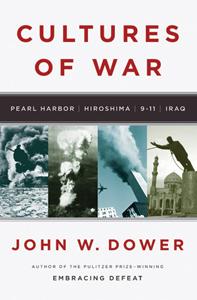Claiming the Moral High Ground
Cultures of War: Pearl Harbor/Hiroshima/9-11/Iraq by John W. Dower ’59 (W.W. Norton)
Reviewed by Sarah Auerbach ’96
 |
[Nonfiction] John Dower’s Cultures of War is not an easy book. And why should it be? There’s nothing easy about the task Dower has taken on: making sense of how we behave when we wage war.
In Cultures of War, Dower examines the four events named in the book’s subtitle: Pearl Harbor, Hiroshima, 9/11 and Iraq—shedding light on how governments and citizens decide to go to war, justify their decisions, carry out violent wartime tasks and build peace afterward. Ultimately the book is about how war distorts our understanding of ourselves, our nation and our history.
Dower, a Ford International Professor of History at MIT, garnered both a Pulitzer and a National Book Award (among other prizes) for his earlier book Embracing Defeat: Japan in the Wake of World War II. (Cultures of War was a 2010 National Book Award finalist.) He’s penned several other books about Japan and produced the Academy Award- nominated documentary Hellfire: A Journey from Hiroshima.
Those credits lend credibility to the often controversial comparisons he draws in Cultures. He compares Japan’s attack on Pearl Harbor and subsequent advance into Southeast Asia to our “war of choice” against Iraq, calling the latter “a tactical success and strategic disaster.” In drawing parallels between 9/11 and Pearl Harbor, he points out that our government was as surprised by bin Laden’s attack as it had been by Japan’s—despite having vowed, after Pearl Harbor, never to be caught off guard again. Most disturbingly, he argues that there are more similarities than differences between 9/11 and Allied bombings of Axis cities during World War II (including Hiroshima and Nagasaki):
Nonstate actors differ from state actors, and terrorist attacks from declared wars. … But at the same time, terror is terror; the civilians and noncombatants killed are all dead; and the moral righteousness and even quasi-theological rationalization that accompany such terror tend to be cut out of the same cloth.
Dower also studies—fascinatingly—the contrasts between the United States’ nation-building in Japan after World War II and in Iraq after invasion. For one thing, Dower points out, Japan was much more isolated. For another, the United States had Japan’s unconditional surrender and the moral authority that accompanied it. The second Bush administration often held up our success in rebuilding Japan as evidence that we could do the same in Iraq. It would have been more apt, Dower argues, to expect a prolonged occupation of Iraq to resemble Israeli occupation of contested territories after 1967 or the Soviet experience in Afghanistan from 1981 to 1989.
By far the most compelling and beautifully written sections of the book are the long passages about Allied bombings of Axis cities and, ultimately, the building and use of the atomic bomb. Dower dwells on the seductiveness of violence itself—something we often leave out of the equation when talking about our collective motives for killing and destruction.
Threaded through these examinations are several key themes. One is that war-makers (including both bin Laden and George W. Bush) claim both the moral high ground and the high ground of rational thinking. The justifications laid out by the Japanese for bombing Pearl Harbor look little different from ours for going to war with Iraq. But each side paints the other as savage and irrational.
Dower also laments the tendency of war-makers to “cherry-pick history.” The second Bush administration did just that, he argues, when it failed to anticipate how hard it would be to win an “asymmetrical war” in Iraq, convincing itself that the United States had lost in Vietnam not because of the strength of the resistance but because of politicians and a “weak-kneed” public back home.
In general, Dower spends too many pages bashing the second Bush administration (Condoleezza Rice wanted consensus at the cost of clarity, he says; Donald Rumsfeld sent a bajillion memos but never hatched a plan), which undercuts his otherwise sound argument that many of that administration’s mistakes could have been made by any war-maker in any war.
The book’s other notable flaw is a final section devoted to “faith-based thinking” and “groupthink” in the recent financial crisis, which, despite Dower’s valiant efforts to tie it into the rest of the material, hangs on by a thread.
In spite of those flaws, Cultures of War is exactly the sort of book that could inspire a whole Amherst course. It would be called “War,” of course, and it would be cross-listed in sociology and history, since the book veers decidedly toward a sociological angle of analysis. Cultures is a book that would benefit from being chunked up into college-style reading assignments—not just because of its length but also because Dower’s sentences require some unwinding. But if you’re in the mood for that kind of read, this is precisely what the professor ordered.
Sarah Auerbach is a freelance writer. Her last piece for Amherst magazine was a review of The Routes of Man, by Ted Conover ’80.